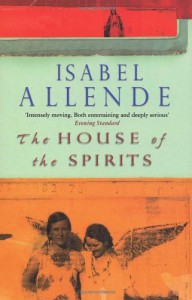Theculturecafe
100 years of Chile through the eyes of Eduardo Truebas

I was weary at first when I took the book displayed with the front cover on a shelve in a travel bookshop.I had try to read some later work by Isabel Allende but could delve into it, so I chose this one with no great expectations. The main character Eduardo Truebas is a diehard, as ruthless as the land he owns, with not much sympathy for the tenants who work on his land. He does not show much compassion for his ill mother and the sister who looks after her, which makes you wonder if the man has got a heart, until he falls head over heals for Rosa who's premature death has him asking her sister Clara's hand. Clara is the complete opposite of Eduardo, she has psychic and medium powers which creates a lot of fantasy in the home she sets up with Eduardo. A bit too much fantasy and flowery wording to my taste but this all part of the story as it seems that the story takes places in a very far remote time with no indication of period except for the mention of the second world war and the revolution. As the family of Eduardo expands with the arrival of the children Blanca, Jaime and Nicholas, the story develops over another 20 years following Clara and Eduardo sharing their time between a huge mansion in the city and the Domaine of Tres Maria in the country. Nothing falls to plan according to Eduardo who became a politician and a well respected figure in the country, all his children end up as a disillusion although he never gives up on them, even when his daughter Blanca gets pregnant out of wedlock. His granddaughter Alba is the one that will mellow him and the difficult times she went through during Pinochet's dictatorship made Eduardo realises he was all wrong about encouraging a coup d'Etat and not supporting a fairer share for the poorer populations.
Isabel Allende gives a very good insight of the history of Chile, the build up towards a revolution in a country where rich land owners still considered peasants and indians as an under class, the sabotage that took place to make Allende's government fail. Is the fact that she never mentions any official names in the story a way to push the reader to do more research about this time period or because she wants to keep the story as a pure work of fiction, anyhow the period of the revolution and the dictatorship is the one that we can refer to as closest to our memory and the most dramactic period in the country's history. The style of writing, giving the reader clues about how the story will unfold can be an annoyance, although it doesnt squander the work of a great story teller.




